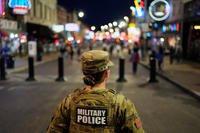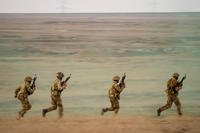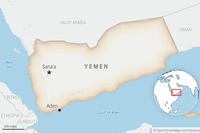Leaders at the Department of Veterans Affairs are working harder than ever before to make the VA a welcoming place for female veterans. But their efforts are being undermined, some female veterans say, by other constituents at the VA: male veterans who act like women don't deserve to be there, or who take advantage of their presence at medical centers to harass them.
"They just don't think we're real veterans," retired Navy Lt. Cmdr. Robbin Alex said of the demeaning attitude behind the harassment female veterans sometimes experience in seeking Department of Veterans Affairs health care.
Former Marine Maj. Kyleanne Hunter said she and other female veterans just want to be treated like everyone else at the VA.
"I want them to realize that we are here to stay," said Hunter, who flew the AH-1 Super Cobra gunship in Iraq and Afghanistan. "Look at us. Treat us like you treat the other veterans. Treat us with respect."
From VA Secretary Robert Wilkie on down, the VA has recognized it has a problem with male veterans who refuse to accept that women have equal status in the military and as veterans. To curb harassment that can lead female veterans to go elsewhere for the health care they've earned, the department has embarked on a campaign to make medical centers nationwide more welcoming places for all veterans -- one that involves explicit warnings not to harass or assault other vets.
Related content:
- The VA Is Trying to Reach Female Veterans About Their Health Care
- Among Veterans Organizations, Health Care, Suicide and Education Are Top Priorities
- Female Veterans Are Fastest Growing Segment of Homeless Veteran Population
- Congresswoman Calls for Investigation of Sexual Harassment at VA
Retired Air Force Col. Ellen Haring said she first noticed the effects of the campaign in the form of a scrolling sign at the Washington, D.C., VA Medical Center (DC VAMC).
"Catcalls and stares are not compliments. They're harassment," it stated.
The DC center also put out on its Facebook page a list of behavioral "do's" and "don'ts" for veterans using the hospital. For instance, it is OK to talk about the weather, but "commenting on someone's body" is not OK.
Next month, DC VAMC, in collaboration with the Veterans Mental Health Advisory Council, plans to convene a Military Sexual Trauma Summit at the hospital.
At the flagship Michael E. Debakey VA Medical Center (MEDVAMC) in Houston last year, the slogan was, "There is no excuse for harassment."
"Cat calls NOT welcome. Staring and whistling -- NOT okay at the VA," the Houston Medical Center said in a release.
The "End Harassment Campaign" at MEDVAMC is aimed at "ensuring women veterans receive their health care in a safe and respectful environment, free of even the hint of sexual harassment." Female veterans are urged to report incidents to hospital security.
"When women feel uncomfortable in our medical center, they are less inclined to come in to receive the medical care they need," Dr. Rola El-Serag, director of MEDVAMC's Women's Health Program, said in the release.
"This can have a hugely negative effect on their health, both mentally and physically," El-Serag said of the harassment. "The thought that a woman veteran who has experienced something like military sexual trauma or is suffering from something like post-traumatic stress disorder would not be comfortable coming to the VA is just unacceptable."
Sexual harassment and assault in the military have been the subject of numerous reports and congressional hearings, but reports of harassment at the VA have largely relied on anecdotal evidence, according to the National Center for Biotechnology Information (NCBI) at the National Institutes of Health.
In a January report, NCBI wrote, "Harassment of servicewomen during military service has been well-documented, but harassment of women veterans in Veterans Affairs (VA) health care settings has not been studied systematically."
The conclusion of an NCBI survey was that "one-quarter of women veteran VA users experienced harassment in VA health care settings."
"These experiences negatively impacted women's health care experiences and use," the survey's authors added.
The VA reported in 2015 that only the number of women who had used at least one VA benefit or services had grown steadily over the last decade, from 31.2 percent in 2005 to 41.1 percent in 2015. And with the population of female veterans poised to grow rapidly in coming years, that figure is set to increase. Per the 2015 data, however, male users still used VA services at higher rates; usage of at least one VA service increased for male veterans from 36 percent in 2006 to 45 percent in 2015.
In a separate 2018 survey, NCBI compared the experiences of lesbian, gay, bisexual and transgender women and non-LGBT men in the routine use of primary care for post-traumatic stress and health care family services at the Veterans Health Administration.
The report stated, "Compared with non-LGBT women, LGBT women were more likely to report harassment and feeling unwelcome at VHA. Some LGBT women reported delaying or missing needed care, primarily due to concerns about interacting with other veterans."
Retired Coast Guard Capt. Judy Keene said those who oppose the presence of women in the military and at the VA are going to have to come to the realization that society has changed since she first entered service.
Keene, 59, of Hagerstown, Maryland, was in the class of 1977 at the Coast Guard Academy, the second service academy to accept women.
"There was significant pressure on us" as women cadets to show that they were up to the mission, she said. "There was a significant part of the population that felt we didn't belong there [and] there was also another segment of the population that wanted us to succeed."
Keene said she had encountered people who tried to make it more difficult for women in service.
"I felt as though that reflected more on them than on me, when they were saying things like 'women belong barefoot and pregnant and in the kitchen,'" she said. "I felt that was more a reflection on them and their orientation to life versus me and the skill sets I possessed."
Alex, the retired Navy lieutenant commander, suggested that the negative attitude toward women is possibly more prevalent among the older generation of veterans.
"It's a minority, not a majority," but it's there, said Alex, 60, who heads a chapter of the veterans advocacy group Team Red White and Blue. "They think they can say anything. You have to say that it's not appropriate."
At the VA, "they'll ask you, 'Where's your husband,'" she said. "They think you're a caretaker. You have to tell them, 'We're veterans too.'"
Women Veteran 'Trailblazers' Honored at VA Event
Alex, Keene and Hunter spoke on the sidelines of an event Wednesday honoring them and 12 other female veterans as "2019 Women Veteran Trailblazers" for their service and work in the community. The event was sponsored by the VA's Center for Women Veterans at the Women In Military Service for America Memorial.
In her remarks at the event, retired Air Force Col. Pamela Powers, Wilkie's chief of staff, said that "doors are continually opening to women" through the trailblazers' example.
"These women didn't sign up to break glass ceilings but, through their integrity, moral courage and determination, they did," Powers said. "You wanted to have the same opportunities as everybody else in the unit. And you wanted to stand out, not because of your gender, but because of what you did."
In her remarks, Anna Crenshaw, deputy director of the VA's Center for Women Veterans, said the VA is seeking to instill a "culture of transformation" across the agency to make it more accommodating to female veterans.
"Cultural transformation is something the center is really striving for, something that has been needed for a long time. It's no secret that women have served valiantly," she said.
The transformation Crenshaw spoke about has been slow in coming at the VA, said Haring, the retired Air Force colonel and interim chief executive officer at the Service Women's Action Network. But she sees encouraging signs.
"I believe there's an acknowledgment" at the VA of the harassment problem for women veterans, Haring said. "I think Wilkie recognizes that."
Push for More Programs Focusing on Female Vets
Last September, at the inaugural meeting of the Military Women's Coalition in Atlanta, Wilkie said, "My pledge to you is the VA will become a welcoming home for all those who have worn the uniform."
He said the department is "on the cusp of great change" in services for women, and "in order to meet that change, we have to change the way of doing business."
The numbers show that the change will have to come quickly in terms of access for female veterans seeking VA health care, officials said at a Feb. 28 hearing of the House Appropriations Subcommittee on Military Construction, VA and Related Agencies.
The wars in Afghanistan and Iraq have resulted in an exponential growth in the number of female veterans now registered for treatment by the Veterans Health Administration, said Patricia Hayes, Women's Health Services chief consultant at the VA.
"The number of women veterans using VHA services has tripled since 2001, growing from 159,810 to 500,000 today," she said in her testimony.
Hayes said the VA is "strategically enhancing services and access for women veterans" through increased reliance on the private sector when treatment services in areas such as gynecology, maternity care, mammography and infertility treatments are not available at the VHA.
However, Rep. Debbie Wasserman Schultz, D-Florida, the subcommittee's chairperson, said, "Having women doctors and gender-specific care programs for women at every single VA facility is the absolute least we can do, and we are not currently providing it."
-- Richard Sisk can be reached at Richard.Sisk@Military.com.














